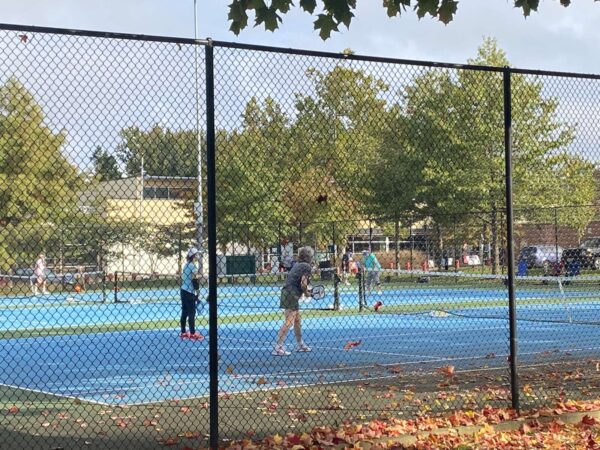
Local residents can now weigh in on the “future of pickleball” at the Walter Reed Community Center.
A survey was sent out earlier this week by the Arlington Dept. of Parks and Recreation (DPR) asking the community to provide input and feedback about the new outdoor pickleball courts coming to the community center at 2909 16th Street S., south of Columbia Pike.
The dedicated courts will replace the tennis courts that are currently there.
The survey asks a series of questions, some with multiple choice answers and some with a text box, including the survey taker’s “current relationship” with the community center, how often they use the pickleball courts already there, and when they typically play.
There’s also a question that addresses the noise coming from the courts, a prickly topic that has led to threats of legal action.
“Noise is a concern associated with pickleball play,” reads the question. “The County is committed to incorporating sound reduction measures as part of this project. What are some creative ideas to consider?”
Locals have through Tuesday, February 28 to provide the county with their thoughts.
Residents voted in November, as part of the bond referendum, to spend $2 million to convert and update existing tennis courts into pickleball courts across the county, including at Walter Reed.
The plan is to convert the current tennis court area into nine dedicated pickleball courts by adding pavement, netting, lighting, fencing, and other needed equipment. There will also be seating, shade, signage, landscaping, ADA-accessible walkways, and “sound reduction measures.” As part of the project, the basketball court will also be converted back to its original use.
This online survey is actually the “start” of the engagement process for the project, DPR spokesperson Martha Holland told ARLnow in an email.
“The County wants to hear from all stakeholders to create a project that serves the pickleball community while fitting into the community context,” she wrote. “The online feedback form is the first step to gather input to inform concept designs. The County hopes to learn and gain insights on a wide range of issues from uses and user experience, as well as considerations, designs, and demographics – to ensure we’re hearing from as many community members as possible.”
Community meetings are set to be held throughout this year to discuss the project, per a recently published timeline on the county’s website. The first is planned for Feb. 16 at 7 p.m. at Walter Reed, Holland said.
There are expected to be additional community meetings and online surveys throughout the year, with several currently scheduled for the spring and summer.
“It is important to make sure that as many people as possible are aware of this project and have a chance to provide input throughout,” Holland said.
With all of this community engagement, construction of the pickleball courts is being pushed back.
Construction is not expected to start for more than a year from now, in spring 2024, per the timeline. Completion is estimated for early 2025, a full two years from now.
In recent years, pickleball has become a hot-button issue in Arlington. The sport soared in popularity during the pandemic, with the county adding more courts to meet demand.
As courts increased, though, so did complaints from some locals about the noise.
When a pickleball hits a paddle, it can often produce a loud pop sound that has become infamously known as “pickleball pop.” This has led DPR to close certain public courts that are situated near homes. At least one court was eventually reopened.
Then, late last year, two citizen groups threatened legal action against the county.
This included a number of neighbors who live across the street from Walter Reed with one resident saying the noise already coming from the courts was “excessive” and “intrusive.” That resident told ARLnow at the time they did not support the plan to build even more outdoor courts.
“It sounds really comical, but when you live across the street from an endless stream of just popping, it’s not funny,” they said.

